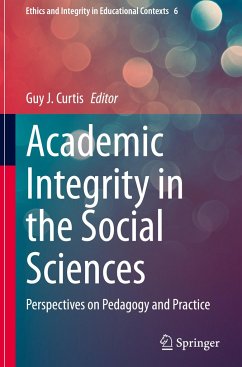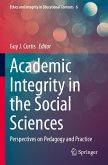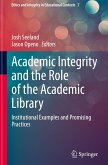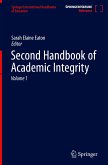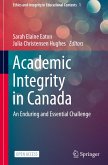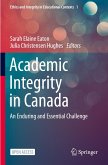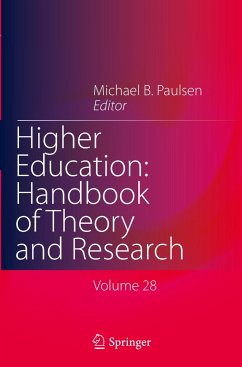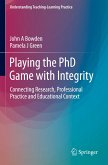Academic Integrity in the Social Sciences
Perspectives on Pedagogy and Practice
Herausgegeben:Curtis, Guy J.
Academic Integrity in the Social Sciences
Perspectives on Pedagogy and Practice
Herausgegeben:Curtis, Guy J.
- Gebundenes Buch
- Merkliste
- Auf die Merkliste
- Bewerten Bewerten
- Teilen
- Produkt teilen
- Produkterinnerung
- Produkterinnerung
This international book provides a series of viewpoints on academic integrity from the perspective of social sciences. It brings together multiple aspects of academic integrity, but with the consistent theme of being at a level of analysis that considers people and their place in the world. It covers topics such as how academic integrity can be taught, and why academic integrity breaches occur.
This book informs the work of researchers, educators, and practitioners as we go forward in understanding academic integrity and addressing academic misconduct. The social sciences include academic…mehr
Andere Kunden interessierten sich auch für
![Academic Integrity in the Social Sciences Academic Integrity in the Social Sciences]() Academic Integrity in the Social Sciences103,99 €
Academic Integrity in the Social Sciences103,99 €![Academic Integrity and the Role of the Academic Library Academic Integrity and the Role of the Academic Library]() Academic Integrity and the Role of the Academic Library125,99 €
Academic Integrity and the Role of the Academic Library125,99 €![Second Handbook of Academic Integrity Second Handbook of Academic Integrity]() Second Handbook of Academic Integrity374,99 €
Second Handbook of Academic Integrity374,99 €![Academic Integrity in Canada Academic Integrity in Canada]() Academic Integrity in Canada38,99 €
Academic Integrity in Canada38,99 €![Academic Integrity in Canada Academic Integrity in Canada]() Academic Integrity in Canada34,99 €
Academic Integrity in Canada34,99 €![Higher Education: Handbook of Theory and Research Higher Education: Handbook of Theory and Research]() Higher Education: Handbook of Theory and Research122,99 €
Higher Education: Handbook of Theory and Research122,99 €![Playing the PhD Game with Integrity Playing the PhD Game with Integrity]() John A BowdenPlaying the PhD Game with Integrity59,99 €
John A BowdenPlaying the PhD Game with Integrity59,99 €-
-
-
This international book provides a series of viewpoints on academic integrity from the perspective of social sciences. It brings together multiple aspects of academic integrity, but with the consistent theme of being at a level of analysis that considers people and their place in the world. It covers topics such as how academic integrity can be taught, and why academic integrity breaches occur.
This book informs the work of researchers, educators, and practitioners as we go forward in understanding academic integrity and addressing academic misconduct. The social sciences include academic disciplines such as sociology, economics, psychology, education, anthropology, political science, and criminology. Researchers and theorists in these fields offer a range of unique and valuable perspectives on academic integrity with questions ranging from: "Why do students cheat and how best do we teach them not to?" to "What are the societal and political implications of academic cheating?"
This book informs the work of researchers, educators, and practitioners as we go forward in understanding academic integrity and addressing academic misconduct. The social sciences include academic disciplines such as sociology, economics, psychology, education, anthropology, political science, and criminology. Researchers and theorists in these fields offer a range of unique and valuable perspectives on academic integrity with questions ranging from: "Why do students cheat and how best do we teach them not to?" to "What are the societal and political implications of academic cheating?"
Produktdetails
- Produktdetails
- Ethics and Integrity in Educational Contexts 6
- Verlag: Springer / Springer International Publishing / Springer, Berlin
- Artikelnr. des Verlages: 978-3-031-43291-0
- 1st edition 2023
- Seitenzahl: 252
- Erscheinungstermin: 20. Oktober 2023
- Englisch
- Abmessung: 241mm x 160mm x 20mm
- Gewicht: 547g
- ISBN-13: 9783031432910
- ISBN-10: 3031432916
- Artikelnr.: 68509442
- Herstellerkennzeichnung
- Books on Demand GmbH
- In de Tarpen 42
- 22848 Norderstedt
- info@bod.de
- 040 53433511
- Ethics and Integrity in Educational Contexts 6
- Verlag: Springer / Springer International Publishing / Springer, Berlin
- Artikelnr. des Verlages: 978-3-031-43291-0
- 1st edition 2023
- Seitenzahl: 252
- Erscheinungstermin: 20. Oktober 2023
- Englisch
- Abmessung: 241mm x 160mm x 20mm
- Gewicht: 547g
- ISBN-13: 9783031432910
- ISBN-10: 3031432916
- Artikelnr.: 68509442
- Herstellerkennzeichnung
- Books on Demand GmbH
- In de Tarpen 42
- 22848 Norderstedt
- info@bod.de
- 040 53433511
Dr Guy Curtis is an Associate Professor in Applied Psychology at the University of Western Australia (UWA) in Perth, Australia. Dr Curtis has been working as a full-time academic since graduating with a PhD in psychology in 2002, and he has been actively researching academic integrity since 2004. He has published over 45 journal articles, including research charting trends and prevalence in academic misconduct and predictors of academic misconduct, and is a co-editor of the book Contract Cheating in Higher Education. Dr Curtis's academic integrity research has been published in top-tier journals such as Studies in Higher Education, Assessment and Evaluation in Higher Education, and Higher Education Research & Development. Dr Curtis has been recognised as a leader in academic integrity advocacy and scholarship. He was contracted by the Tertiary Education Quality and Standards Agency (TEQSA, Australia) as part of an expert team to provide national workshops and an academicintegrity toolkit in Australia in 2019-2020. He is a multi-award-winning university teacher and in 2021 he was awarded the inaugural Studiosity Tracey Bretag Prize for his outstanding commitment to advancing the understanding and implementation of academic integrity.
Series Editors' Note.- Preface.- Acknowledgements.- Chapter 1 Do students follow the wisdom or the madness of crowds? (Guy J. Curtis).- Chapter 2. Removing the 'opportunity' for academic misconduct: A criminology-based framework for preventing academic integrity problems (Joseph Clare).- Chapter 3. Moral frameworks for approaching academic integrity (Frances An).- Chapter 4. Lies, lies, lies: Detecting deception and implications for investigations of academic cheating (Brenda M. Stoesz).- Chapter 5. Capitalising on emotions and emotional regulation: Five strategies to improve academic integrity (Holly E. Tatum & Guy J. Curtis).- Chapter 6. Developing and implementing policies for academic integrity: Management of change (Irene Glendinning).- Chapter 7. Evaluating the impact of implemented academic integrity policy on creative works (Stella-Maris Orim & Anirejuoritse Awala-Ale).- Chapter 8. Conducting academic integrity research with undergraduates (David A. Rettinger).- Chapter9. A pedagogy for teaching research ethics and integrity in the social sciences (Erika Löfström & Anu Tammeleht).- Chapter 10. Researching academic integrity: Application of social sciences research methods (Inga Gaizauskait & Natalija Valavicien ).- Chapter 11. Academic Integrity as a way to promote workplace ethical behavior (Jean Gabriel Guerrero-Dib, Luis Portales, Daniela Gallego).- Chapter 12. Tactics of scholarly abuse (Brian Martin).- Chapter 13. Academic Integrity through the Lens of Informality (Elena Denisova-Schmidt).- Chapter 14. The 'Patrick Matthew Effect' in science (Mike Sutton & Mark Griffiths).- Afterword: The future of academic integrity and the social sciences.- Index.
Series Editors’ Note.- Preface.- Acknowledgements.- Chapter 1 Do students follow the wisdom or the madness of crowds? (Guy J. Curtis).- Chapter 2. Removing the ‘opportunity’ for academic misconduct: A criminology-based framework for preventing academic integrity problems (Joseph Clare).- Chapter 3. Moral frameworks for approaching academic integrity (Frances An).- Chapter 4. Lies, lies, lies: Detecting deception and implications for investigations of academic cheating (Brenda M. Stoesz).- Chapter 5. Capitalising on emotions and emotional regulation: Five strategies to improve academic integrity (Holly E. Tatum & Guy J. Curtis).- Chapter 6. Developing and implementing policies for academic integrity: Management of change (Irene Glendinning).- Chapter 7. Evaluating the impact of implemented academic integrity policy on creative works (Stella-Maris Orim & Anirejuoritse Awala-Ale).- Chapter 8. Conducting academic integrity research with undergraduates (David A. Rettinger).- Chapter9. A pedagogy for teaching research ethics and integrity in the social sciences (Erika Löfström & Anu Tammeleht).- Chapter 10. Researching academic integrity: Application of social sciences research methods (Inga Gaižauskaitė & Natalija Valavičienė).- Chapter 11. Academic Integrity as a way to promote workplace ethical behavior (Jean Gabriel Guerrero-Dib, Luis Portales, Daniela Gallego).- Chapter 12. Tactics of scholarly abuse (Brian Martin).- Chapter 13. Academic Integrity through the Lens of Informality (Elena Denisova-Schmidt).- Chapter 14. The ‘Patrick Matthew Effect’ in science (Mike Sutton & Mark Griffiths).- Afterword: The future of academic integrity and the social sciences.- Index.
Series Editors' Note.- Preface.- Acknowledgements.- Chapter 1 Do students follow the wisdom or the madness of crowds? (Guy J. Curtis).- Chapter 2. Removing the 'opportunity' for academic misconduct: A criminology-based framework for preventing academic integrity problems (Joseph Clare).- Chapter 3. Moral frameworks for approaching academic integrity (Frances An).- Chapter 4. Lies, lies, lies: Detecting deception and implications for investigations of academic cheating (Brenda M. Stoesz).- Chapter 5. Capitalising on emotions and emotional regulation: Five strategies to improve academic integrity (Holly E. Tatum & Guy J. Curtis).- Chapter 6. Developing and implementing policies for academic integrity: Management of change (Irene Glendinning).- Chapter 7. Evaluating the impact of implemented academic integrity policy on creative works (Stella-Maris Orim & Anirejuoritse Awala-Ale).- Chapter 8. Conducting academic integrity research with undergraduates (David A. Rettinger).- Chapter9. A pedagogy for teaching research ethics and integrity in the social sciences (Erika Löfström & Anu Tammeleht).- Chapter 10. Researching academic integrity: Application of social sciences research methods (Inga Gaizauskait & Natalija Valavicien ).- Chapter 11. Academic Integrity as a way to promote workplace ethical behavior (Jean Gabriel Guerrero-Dib, Luis Portales, Daniela Gallego).- Chapter 12. Tactics of scholarly abuse (Brian Martin).- Chapter 13. Academic Integrity through the Lens of Informality (Elena Denisova-Schmidt).- Chapter 14. The 'Patrick Matthew Effect' in science (Mike Sutton & Mark Griffiths).- Afterword: The future of academic integrity and the social sciences.- Index.
Series Editors’ Note.- Preface.- Acknowledgements.- Chapter 1 Do students follow the wisdom or the madness of crowds? (Guy J. Curtis).- Chapter 2. Removing the ‘opportunity’ for academic misconduct: A criminology-based framework for preventing academic integrity problems (Joseph Clare).- Chapter 3. Moral frameworks for approaching academic integrity (Frances An).- Chapter 4. Lies, lies, lies: Detecting deception and implications for investigations of academic cheating (Brenda M. Stoesz).- Chapter 5. Capitalising on emotions and emotional regulation: Five strategies to improve academic integrity (Holly E. Tatum & Guy J. Curtis).- Chapter 6. Developing and implementing policies for academic integrity: Management of change (Irene Glendinning).- Chapter 7. Evaluating the impact of implemented academic integrity policy on creative works (Stella-Maris Orim & Anirejuoritse Awala-Ale).- Chapter 8. Conducting academic integrity research with undergraduates (David A. Rettinger).- Chapter9. A pedagogy for teaching research ethics and integrity in the social sciences (Erika Löfström & Anu Tammeleht).- Chapter 10. Researching academic integrity: Application of social sciences research methods (Inga Gaižauskaitė & Natalija Valavičienė).- Chapter 11. Academic Integrity as a way to promote workplace ethical behavior (Jean Gabriel Guerrero-Dib, Luis Portales, Daniela Gallego).- Chapter 12. Tactics of scholarly abuse (Brian Martin).- Chapter 13. Academic Integrity through the Lens of Informality (Elena Denisova-Schmidt).- Chapter 14. The ‘Patrick Matthew Effect’ in science (Mike Sutton & Mark Griffiths).- Afterword: The future of academic integrity and the social sciences.- Index.

